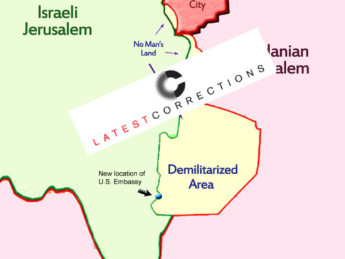
CAMERA Prompts NY Times Update on US Embassy Location
Following communication by CAMERA, the New York Times updated its piece to note that the new embassy isn't partially in east Jerusalem, but rather what was called "No Man's Land," which separated the western and eastern sectors of the city.

 CAMERA prompted a Reuters correction in a story about Saudi acknowledgement of a Jewish right to self-determination in Israel. The story originally referred to a rapprochement between "Riyadh and Tel Aviv" to denote the seats of the governments of Saudi Arabia and Israel.
CAMERA prompted a Reuters correction in a story about Saudi acknowledgement of a Jewish right to self-determination in Israel. The story originally referred to a rapprochement between "Riyadh and Tel Aviv" to denote the seats of the governments of Saudi Arabia and Israel.